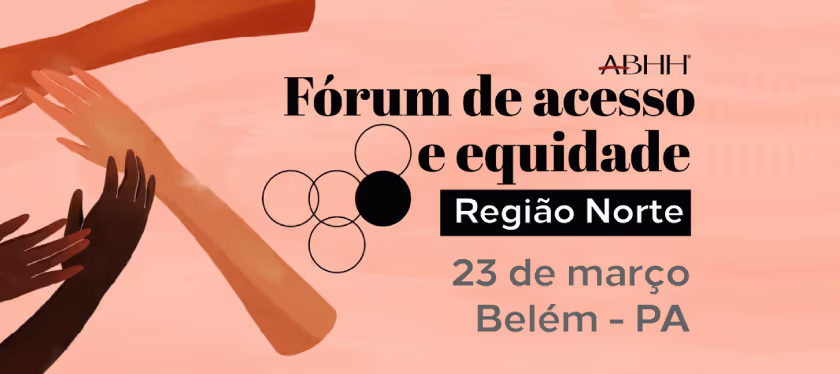In yet another regional agenda, the ABHH Equity Program promoted the Access and Equity Forum in Belém/PA this Saturday (23). The program included a list of debates on the topic, with the participation of important representatives of oncohematology, such as the Member of the ABHH Equity Committee, hematologist Thiago Xavier, who represented the Northern Region of the Country, led the organization of the event and celebrated the success of the discussions.
At the opening in the morning, the president of ABHH, Dr. Angelo Maiolino, recalled that the journey of equity, now part of the Association's mission, began in 2018 with the creation of the Access Committee. The speech was complemented by the now Director of Professional Defense, Dr. José Francisco Comenalli Marques, former president of ABHH.
At the first panel of the day, the general coordinator of the National Cancer Prevention and Control Policy, Fernando Maia, spoke about the importance of integration between specialists and managers. Speaker Sandra Gioia gave an extensive explanation of Navigation for People Diagnosed with Cancer and how Navigation can help make the patient's journey more efficient. Both discussed the issue, with the mediation of ABRALE's CEO, Catherine Moura.
Also in the morning, the coordinator of the ABHH Equity Committee, Dr. Renato Cunha, explained the Association's initiatives and launched a survey to guide actions in the coming years. Also a member of the Committee, Dr. Marcelo Capra, from Porto Alegre/RS, presented successful initiatives of Grupo Hospitalar Conceição in the management and monitoring of patients in the areas of oncology and oncohematology.
CONSTRUCTION OF PRACTICAL PROPOSALS
In the afternoon and the second block of the meeting, the Forum opened space for debates focused on the construction of practical proposals. The hematologist Thiago Carneiro, from the State University of Pará (UEPA) and the Ophir Loyola Hospital (HOL), a member of the ABHH Equity Committee and one of the organizers of the event, explained the dynamics of the debates. “The idea is that we can talk, bring points of view, practical experiences and challenges to prepare proposals and try to materialize,” he said.
Regarding multidisciplinary patient care, Ivison Carvalho, representing the Municipal Health Department of Belém/PA, the HOL Bone Marrow Transplant Coordinator, Rosana Moreira, and hematologist James Maciel, also from the ABHH Equity Committee, participated in the panel. In Ivison's view, the key to integrating all the professionals who work in the patient's journey are communication models.
“Everyone involved in the care must look at the problem, establish a goal and conduct, that is, look at what the patient needs, define a therapeutic line and establish objectives, in an integrated manner,” he added. “Having up-to-date professionals, who seek constant knowledge, and offering training are also initiatives that make a difference,” added Rosana.
The hematologist and transplanter João Saraiva, son of the former president of SBHH, João Carlos Pina Saraiva and Director of the IHEBE Institute in Belém, also worked to hold the event locally. During her speech at the session about challenges for acute leukemia, chronic myeloid leukemia (CML) and chronic lymphocytic leukemia (CLL), Saraiva spoke about the importance of knowing the many existing “Brazils” when looking at the healthcare access scenario.
“It's very difficult to guide patients to continue their treatment at home, to be discharged early, if they often don't have running water inside the house,” she lamented about a chronic reality that impacts medical practice. “In other words, they are a series of nuances that we have to look at when talking about access and equity,” he added.
When designing the map of Pará on the screen of the event, the hematologist also showed that hematological care is still centered in the state capital, and the closest place with this type of care is an hour and a half from Belém. “Based on these points and other nuances, it is easy to understand the difficulties in diagnosing and treating, for example, chronic myeloid leukemia, a hematological disease that requires extensive monitoring,” he said.
The full program is available on ABHH's YouTube and can be viewed in full at the link: https://www.youtube.com/watch?v=LlRW77CzfQI
—
The Northern Region Forum was also featured in the state's main newspaper, O Liberal:
https://www.oliberal.com/para/belem-recebe-evento-nacional-que-debate-cancer-hematologico-1.794788









